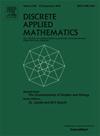Single machine scheduling with a restricted rate-modifying activity to minimize the weighted makespan
IF 1
3区 数学
Q3 MATHEMATICS, APPLIED
引用次数: 0
Abstract
We investigate the single machine scheduling problem with a restricted rate-modifying activity (RMA) aimed at minimizing the weighted makespan. The RMA is an activity that modifies the machine’s production rate while occupying it for a specified duration. Importantly, its starting time is constrained to fall within a predetermined interval . Our results demonstrate that the special case where parameter admits a polynomial-time solution, while the cases with or are proven to be binary NP-hard. For these NP-hard problems, we develop pseudo-polynomial time dynamic programming solutions. Notably, in the scenario where splitting is permitted, we establish a polynomial-time algorithm for the case, which in turn enables the derivation of a 2-approximation algorithm for the non-split version. Additionally, by combining our dynamic programming approach with the vector trimming technique, we achieve fully polynomial-time approximation schemes (FPTAS) for all NP-hard variants under consideration.
单台机器调度,限制速率修改活动,以最小化加权完工时间
本文研究了具有限制速率修正活动(RMA)的单机调度问题,该问题旨在使加权最大完工时间最小化。RMA是一种活动,它在指定的持续时间内占用机器,同时修改机器的生产率。重要的是,它的起始时间被限制在一个预定的区间内[a,b]。我们的结果证明了参数a=0的特殊情况允许多项式时间解,而b=∞或b=a的情况证明是二进制np困难的。对于这些np困难问题,我们开发了伪多项式时间动态规划解。值得注意的是,在允许分裂的情况下,我们为b=a的情况建立了一个多项式时间算法,这反过来又使得非分裂版本的2-近似算法的推导成为可能。此外,通过将我们的动态规划方法与向量修剪技术相结合,我们为所有正在考虑的NP-hard变量实现了完全多项式时间近似方案(FPTAS)。
本文章由计算机程序翻译,如有差异,请以英文原文为准。
求助全文
约1分钟内获得全文
求助全文
来源期刊

Discrete Applied Mathematics
数学-应用数学
CiteScore
2.30
自引率
9.10%
发文量
422
审稿时长
4.5 months
期刊介绍:
The aim of Discrete Applied Mathematics is to bring together research papers in different areas of algorithmic and applicable discrete mathematics as well as applications of combinatorial mathematics to informatics and various areas of science and technology. Contributions presented to the journal can be research papers, short notes, surveys, and possibly research problems. The "Communications" section will be devoted to the fastest possible publication of recent research results that are checked and recommended for publication by a member of the Editorial Board. The journal will also publish a limited number of book announcements as well as proceedings of conferences. These proceedings will be fully refereed and adhere to the normal standards of the journal.
Potential authors are advised to view the journal and the open calls-for-papers of special issues before submitting their manuscripts. Only high-quality, original work that is within the scope of the journal or the targeted special issue will be considered.
 求助内容:
求助内容: 应助结果提醒方式:
应助结果提醒方式:


